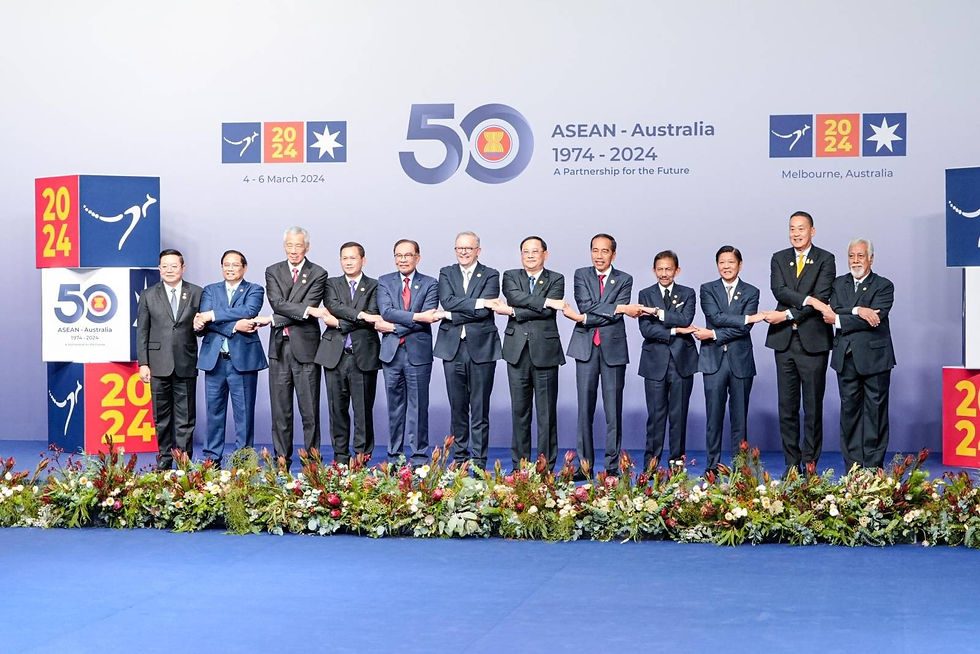Between Dynasty and Dependency: Southeast Asia’s Political Future After USAID
- Aug 5, 2025
- 4 min read
Carlos Hasham

Image sourced from Presidential Communications Office via Wikimedia Commons.
The recent collapse of United States (US) foreign aid programs has reverberated globally, but nowhere more consequentially than in Southeast Asia, a region historically subject to development assistance and now precariously positioned at the frontier of China’s strategic orbit. This moment marks more than just a lapse in foreign assistance. It signals a structural shift in the region’s political economy, underscoring a broader drift away from liberal governance and towards a model of development without democratisation.
The abrupt dismantling of USAID-funded civil society, anti-corruption and humanitarian initiatives, coupled with China’s immediate reaction to this vacuum, risks reinforcing patronage networks and constraining prospects for institutional accountability across the region. Such developments demand sustained attention from Australia, which must remain acutely aware of the deterioration of democratic infrastructure and recognise its critical responsibility to uphold and advocate for democratic principles amid a shifting balance of regional influence.
USAID’s Collapse and Its Democratic Fallout
In the 2024 fiscal year, USAID allocated USD$837 million to ASEAN member states, funding a vast network of social programs and NGOs dedicated to disease prevention, humanitarian assistance and, crucially, anti-corruption and democratic transparency. This has not only strengthened institutions managing the socio-political dysfunctions perpetuated by oligarchic politics, but advanced electoral and political reform in the region. However, Trump’s 90-day suspension on U.S. development assistance, was the beginning of America’s foreign aid retreat. Since then, over 92 per cent of overseas development and aid contracts totalling USD$54 billion were cut, with Marco Rubio confirming the dissolution of USAID itself.
Among the biggest regional losses of USAID achievements was its FPI and E-PESO programs in the Philippines, which supported budget transparency reforms that constrained avenues for clientelist patronage. Similarly in Thailand, the Manushya Foundation, which provided legal assistance and advocacy for political activists fleeing Cambodia, Laos, and Vietnam, relied on USAID for 75 per cent of its funding and now faces imminent closure. Moreover, the Trump Administration cancelled federal grants to Radio Free Asia, one of the largest independent broadcasters in Southeast Asia, which had served as a rare conduit for uncensored reporting across Myanmar, Laos, and Cambodia.
The Return of Dynasties and Erosion of Accountability
The retreat of U.S. fiscal assistance coincides with a region-wide resurgence of dynastic continuity. In 2024, Thailand witnessed the political resurgence of the Shinawatra dynasty. In Cambodia, Hun Sen formally transferred leadership to his son, after four decades of autocratic rule. Laos followed suit with the appointment of Sonexay Siphandone as Prime Minister in 2022, son of former ruling party chairman Khamtai Siphandone. Meanwhile, the Philippines saw the unprecedented return of the Marcos family, as Ferdinand ‘Bongbong’ Marcos Jr. secured the presidency.
These recent restorations are unlikely to be the last; as America retreats, so too do the civic checks and balances it once underwrote. Between the fiscal years 2019 and 2023, USAID allocated over USD$132 million towards anti-corruption initiatives across six Asian countries, including Cambodia, the Philippines, and Indonesia. In their newfound absence, the political architecture of Southeast Asia is increasingly insulated from external reform pressures, rendering its opaque, dynastic power structures all the more resistant to change. Unencumbered by demands for transparency or accountability, these governments will not be deterred by Chinese aid, which advances a model of state-led investment devoid of democratic safeguards.
China’s Alternative Model of Influence
Despite assertions that China lacks the humanitarian expertise, institutional networks, and financial reach historically wielded by USAID, it is positioning itself to fill the vacuum left by the US. Such an evolution will likely come at the expense of transparency, participatory governance, and robust civil society engagement. This is already evident in states like Cambodia, where democratic institutions have steadily deteriorated amid deepening ties with China. In February, the Cambodian Mine Action Centre received a pledge of USD$4.4 million from Beijing, more than double the USD$2 million contribution made by the U.S. the previous year.
China’s strategic intervention in Cambodia is likely the first in a broader pattern of assistance that will redefine the contours of development and democracy in the region. In the absence of meaningful democratic conditionality, the leverage once exerted through foreign aid will continue to diminish, eroding disincentives for ruling parties, and now entrenched political families, to suppress dissent and undermine electoral integrity.
Australian Action Required
Australia’s decision to reallocate AUD$119 million towards essential health services and climate resilience in the Asia-Pacific, alongside an additional AUD$5 million to sustain HIV programs in Fiji, Papua New Guinea, and the Philippines, reflects a commitment to stability over ambition. Yet the collapse of American soft power, demands more than continuity. As dynastic ‘kleptocracy’ deepens across Southeast Asia, Australia stands at a crossroads: to either preserve its traditional aid posture or assert itself as a principled middle power willing to counterbalance illiberal expansion.
The choice to prioritise incremental support over assertive engagement risks ceding normative leadership in Southeast Asia to powers less invested in transparency and institutional accountability. What confronts Australia is not merely the obligation to sustain aid, but the strategic imperative to steward democratic norms.
Carlos Hasham is an Arts/Law student at the University of New South Wales, Sydney. For his semester abroad, he was selected to undertake a specialised international law program at Bocconi University, Milan, where he developed a particular interest in the political economy of Southeast Asia. This was reinforced through his appointment as an Australian delegate for the 2024/25 Australia-Indonesia Youth Exchange Program, during which he spent a month living with a host family on the island of Lombok. He currently serves as a Research and Strategy Officer for the UNSW ASEAN Society and is set to attend the Australian Crisis Simulation Summit in Canberra later this year.



Comments